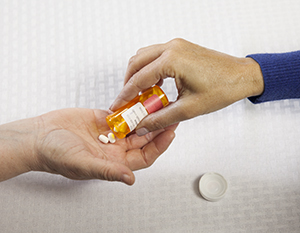Spinal Cord Injury (SCI): Managing Medicines
Treatment for spinal cord injury (SCI) often includes medicines. These help ease symptoms or prevent infections and other problems. They also help improve your health. To work their best, medicines must be taken as directed. Doing this while juggling everything else you need to focus on may be difficult, but it’s important. When medicines aren’t taken correctly, they may not help you. And they can even harm your health. To protect yourself, learn all you can about your medicines and how to use them safely.
 |
| Take medications on time and exactly as directed. |
Changes in your body
Your body goes through many changes after an SCI. This includes how your body absorbs medicine. If you used a medicine, herb, or vitamin before your injury, it may work differently now. And you may be at higher risk for side effects and interactions between medicines than before. So be sure all of your health care providers know about all the medicines you take. This includes things you buy over the counter as well as prescription medicines. It also includes herbs, vitamins, and other supplements. This will help keep you safe and healthy.
Tips for managing medicines
Your care team members can help you create a medicine plan. Follow this plan to make sure of the best and safest use of your medicines. In addition:
-
Know what you’re taking and how to use it. Check with your healthcare provider, or pharmacist before taking anything new. Know what the medicine is for. Ask about side effects. Also ask if there are safety steps you need to take when using it. You may also have special directions. These may include taking the medicine with food or on an empty stomach, and not taking it with other medicines.
-
Don’t stop taking a medicine without talking with your provider. If you think a medicine isn’t helping or that you no longer need it, talk with your provider first. Stopping medicines suddenly can cause problems. Your provider needs to know what medicines you are or aren't taking.
-
Report problems. Tell your provider if you have any concerning side effects or symptoms after taking a medicine. They may change the dosage or type of medicine you’re using.
-
Get the best form for you. Medicines come in many forms, not just pills. If you have trouble swallowing, for instance, some medicines can be given as liquids, drops, or patches. If you have any problems taking a medicine, let your provider know. Don't t crush or break a medicine without talking with your provider or pharmacist first.
-
Keep a current list of your medicines. This may be needed in case of emergencies. Include the names, dosage, and times of the day you take each medicine. Carry this list with you for any healthcare visits or hospital admissions. Also give a copy to your caregiver and loved ones.
-
Fill all your prescriptions at the same pharmacy. This keeps your records in 1 place. This also makes it easier to check for possible medicine interactions.
-
Try using a pillbox to help you keep track of daily medicines. Get 1 labeled by the day of the week. Fill the box each week for the entire week.
-
Take correct care of your medicines. Store your medicines as directed. Also don’t keep old medicines around. Dispose of them correctly when they expire.
© 2000-2025 The StayWell Company, LLC. All rights reserved. This information is not intended as a substitute for professional medical care. Always follow your healthcare professional's instructions.